Iran’s Short Film Association Denounces Regime’s Killing Of Children
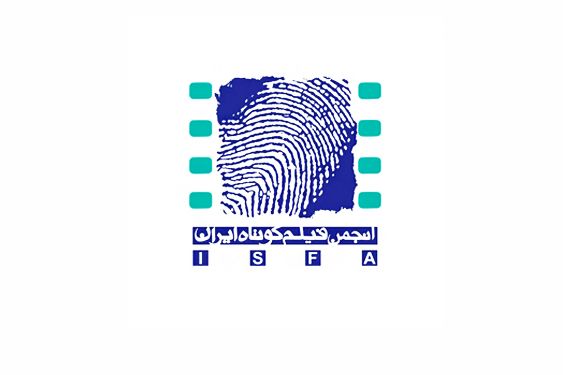
The Iranian Short Film Association has condemned the killing of youngsters and children by government forces saying that from now on it will stand with the people of Iran.

The Iranian Short Film Association has condemned the killing of youngsters and children by government forces saying that from now on it will stand with the people of Iran.
In a statement on Saturday, ISFA slammed the killing of Kian Pirfalak, the 10-year-old boy who was killed by security forces who fired at his family car in the city of Izeh, adding that “From now on, we will live and work in reality and stand where the dear people of Iran stand.”
ISFA also condemned “many redlines” by the Islamic Republic in filmmaking such as “infanticide”, adding that this time children are killed not in the movies but in a very horrifying way on streets.
Since the uprising, at least 47 children have been killed by security forces, with Kian Pirfalak killing as one of the most shocking incidents that aroused strong public anger.
The production of any short or feature film in the Islamic Republic requires a license from the ministry of culture and Islamic guidance, but the Short Film Association has stated that “from now on, retaining rights and expression of opinion does not need any license except the will of the nation.”
More than two months since the beginning of nationwide protests, the government is still heavily suppressing demonstrators. So far, nearly 400 people have been killed including women and children. As the number rapidly rises, the Islamic Republic refuses to accept responsibility and attributes the killings to terrorist and foreign groups.

The protests in Iran continued overnight into Sunday as the Islamic Republic resorted to deploying the military to quash protesters who had gained control over a small city.
The mourning ceremonies for two protesters who were killed in recent days in Mahabad, a small Kurdish-majority city in West Azarbaijan province, turned into fierce protests throughout the day and by night the whole city was in control of the protesters.
Incessant gunshots were heard in videos from Mahabad as the Internet and power were shut down in parts of the city while regime forces kept shooting and breaking windows of people's homes.
According to footage published on social media, the streets of Mahabad are packed with military vehicles, and the situation in the city is so tense that it seems martial law has been declared. In one of the incidents, a large gathering was held by the city’s authorities in which people were told the governor would deliver a speech, but security forces opened fire at the crowd. The number of casualties from the city remains unknown.
Many people on social media have called for support for the people of Mahabad. Iranian football legend Ali Karimi, a key supporter of the popular uprising, called on Iranians to immediately help Mahabad amid fears of a massacre. "Shame on you for deploying tanks to crack down on people who are emty-handed," Karimi tweeted.
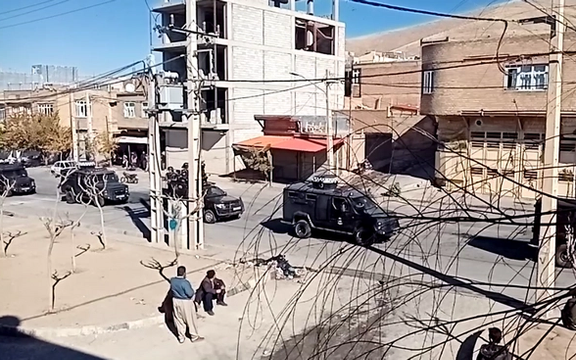
The Democratic Party of Iranian Kurdistan (PDKI), issued a statement on Sunday condemning the indiscriminate crackdown on residents of Kurdish cities and towns. PDKI, which is banned in Iran as an anti-government group, is based in the Iraqi Kurdistan.
“Saturday evening, November 19, the Iranian regime appears to have imposed martial laws in the Kurdish city of Mahabad. Iran's terrorist Islamic Revolutionary Guard Corps (IRGC) has reportedly entered Mahabad with heavy military weapons and equipment... The lives of many people are in danger.” read the statement.
The party also called on the international community and human rights organizations to not remain silent over “the massacre of the Kurdish people,” noting that the silence of the international community will further embolden the regime to target innocent people and demonstrators.
German member of European Parliament Hannah Neumann also tweeted in support of the residents of the city. “Gun shots. Civilians screaming. Electricity turned off. Limited internet access. The regime kills in darkness. We need to put the spotlight on what happens,” she said.
People in other cities of the province, including Boukan (Bukan), Khoy, Piranshahr, and Oshnavieh, also poured into streets to express support for the people of Mahabad.
Iranians have been holding daily demonstrations for more than two months but the protests were mainly in big cities. In recent days small towns have also become scenes of unrest as mourning ceremonies for fellow residents happen to morph into protest rallies.
In addition to pockets of protests in large cities, Marivan and Divandarreh in Kodestan province, Malekan in East Azarbaijan province, Mahallat and Saveh in Markazi, Golpayegan in Esfahan, Paveh in Kermanshah, and many more are the scenes of protests on Sunday.
As people are protesting across the country, large numbers of expatriate Iranians in diaspora communities held rallies in support of the protests in over 100 cities on Saturday.
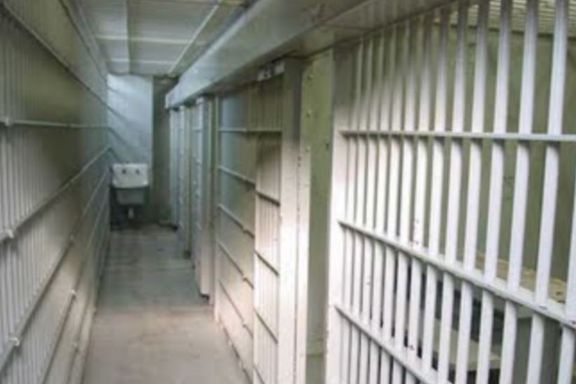
A group of American poets have published a letter demanding the release of writers, poets and intellectuals imprisoned by the Islamic Republic of Iran.
Charles Bernstein, the founder of the language poetry movement in America and one of the most important figures of avant-garde poetry and the winner of the prestigious "Bollingen" award prepared the letter.
Over two dozen poets who signed the letter said, “as American poets who have committed our lives to free expression, we are devastated by the attacks on our fellow poets and writers in Iran.”
“While the horrific news of the attacks of women and girls, and indeed on men and boys, has been publicized, the attacks on these Iranian poets and writers have not been fully reported,” they added.
The letter mentions a long list of poets, writers and translators in Iran saying, “We call out to these poets and writers: we see you, we care, we stand with you, we want to read your future works.”
“Poetry matters — in the U.S. and in Iran. The imprisonment of these Iranian literary artists is an attack on all of us,” reads the letter.
They have also published the names of detained intellectuals in Iran, including Atfeh Chaharmahalian, Amirhossein Barimani, Nasibeh Nami’Far, Kaveh and Yashar Dar’al Shafa, Keyvan Mohtadi.
Anne Waldman, Pierre Joris, Jerome Rothenberg and Charles Bernstein are among the signatories.
During the recent protests in Iran, over 110 writers, journalists and artists have been reportedly arrested, threatened, or harmed by the security forces for political reasons.

A lot of Iranians love soccer but not their national football team anymore as Team Melli keeps distancing itself from solidarity with the current wave of protests across the country.
Iran’s football squad is nicknamed Team Melli – literally translated as national team – but their lack of support for the ongoing protests and their attempts to ingratiate themselves with the clerical regime has led to a new nickname for them: “Team Mullah”.
On Friday, two of the players -- Karim Ansarifard and Morteza Pouraliganji -- refused to answer questions on solidarity with women, a day after another team member, Alireza Jahanbakhsh suggested that such questions were meant to distract the team before World Cup matches.
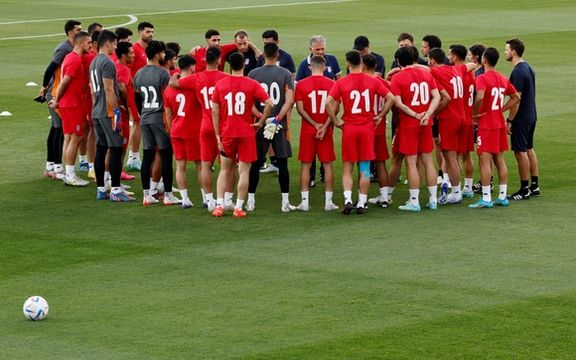
Jahanbakhsh accused British media of distracting the team ahead of Monday's Group B opener against England and Ansarifard jumped to his defense at a news conference, repeatedly stressing team unity. "It's my professional duty to play football and your professional duty to ask questions, but we all need to do things appropriately in our profession. This is why we always defend each other and tell the truth.”
Ansarifard added that "It's an absolute honor regardless of who comes to the stadiums, whether it's our fathers, our brothers, our men or women. We play for all men and women of our country. When I say people of our country, there's no exception. That includes all men and all women. We have respect for all fans around the world. Iran has some of the best fans... We've got passionate fans who are very loyal. We're famous for it and we're very proud of them."

Ansarifard, who spent a year at British club Nottingham Forest, also talked about the team’s match against England and expressed hope that Iran would qualify for the knockout stages for the first time. "I'm relatively familiar with English football... England has one of the best leagues and some of the world's best players. I've always tried to pass on my interpretations of English football to my teammates."
When a similar question about the protests in Iran was posed to Pouraliganji, the coordinator stepped in and requested questions on the World Cup only.
Last week, national team coach Carlos Queiroz replied to a reporter, who asked him about the situation in Iran, with the same strategy, trying to divert the conversation to issues related to UK.
Their unsympathetic tone came on the backdrop of several Iranian sportsmen and women using international competitions to show their support for the protests that have rocked the country since the death of 22-year-old Mahsa Amini in the custody of the morality police in mid-September.
Numerous Iranian athletes have shown support for the protests. The Iranian football, beach football, waterpolo, basketball, and sitting volleyball teams refused to sing along with the anthem, which is customary in almost all international competitions. Authorities have made serious threats against athletes and other celebrities to stop them from public displays of solidarity with protesters but to no avail.
During the past few days, Iranian legendary striker Ali Daei and outspoken star Ali Karimi, who has been charged in absentia for supporting the protests, said they rejected invitations by Qatar to watch the World Cup matches.
Iran's first ever meeting with England is overshadowed by the events in the country, no matter how hard Iranian authorities try to keep politics out of the pitch, especially against England’s players who are known for taking the knee in protest to racial injustice. The British squad – nicknamed the “Three Lions” -- will probably kneel before their match against Team Melli in support of the protests in Iran. The Lions are likely going to be applauded by the Iranian fans better than the applause awaiting the Islamic Republic’s team.
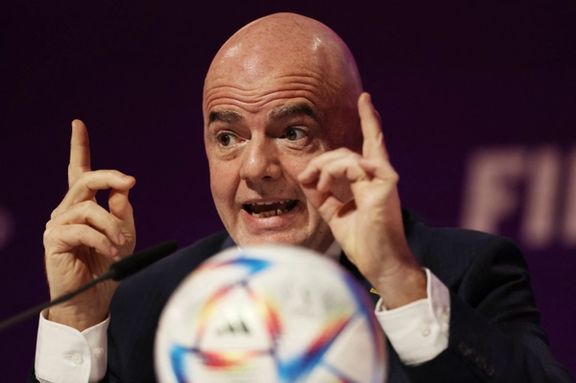
FIFA president Gianni Infantino has defended the presence of the Iranian national soccer team at the World Cup in Qatar despite calls for dropping the team over the crackdown on protests.
During a news conference on the eve of the start of the tournament on Saturday, Infantino said, "It's not two regimes playing against each other, it's not two ideologies playing against each other, it's two football teams” implying that the crimes of governments should not stop teams from competing.
"If we don't have at least football to bring us together... which world are we going to live in? In Iran there are 80 million people, are they all bad? Are they all monsters?" he said.
“Do we want to continue to spit on the others because they look different, or they feel different? We defend human rights. We do it our way. We obtain results. We got women fans in Iran. The Women’s League was created in Sudan. Let’s celebrate. Don’t divide,” Infantino said as an apparent – but incoherent attempt – to defend hosting the World Cup by Qatar.
For nearly a decade, Russia and Qatar have been suspected of buying votes to win hosting rights for the 2018 and 2022 World Cups.
He also rounded on European critics of the host nation over the issues of migrant workers and LGBT rights.
On Friday, German Football Association (DFB) chief Bernd Neuendorf said the country decided not to back Infantino's re-election next year over the soccer' body's handling of human rights issues at World Cup hosts Qatar and its failure to take a stand on Iran.
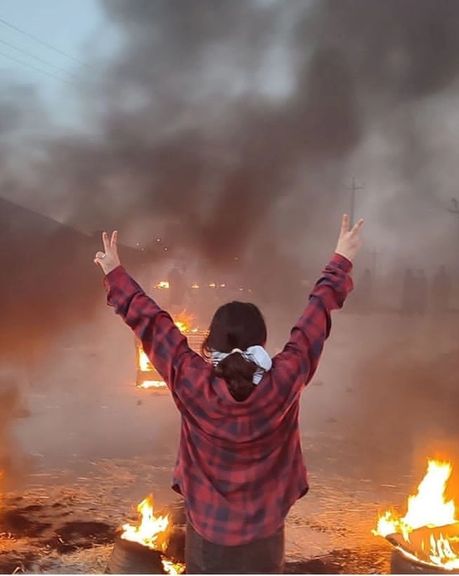
Protests against the Islamic Republic continued in Iran and many cities around the world Saturday to honor protesters killed across Iran and to condemn the regime.
The third month of the protests started with demonstrations and sit-ins at universities in the morning, as workers of the country's largest car parts manufacturer joined the nationwide strikes and clashes were reported during funerals and mourning ceremonies for those who were killed in recent days.
According to reports, security forces attacked the dormitory of medical students in Esfahan early Saturday morning and arrested several students. The raid was carried out hours after professors of the three universities of Esfahan, Shiraz and Tehran’s Beheshti issued separate letters demanding an end to the attacks inside universities and student dormitories.
In addition to universities, staff at many schools across the country are set for strikes on Sunday and Monday upon a call by the Coordination Council of Iranian Teachers' Trade Associations in reaction to the schoolchildren killed in the past few days.
Since the protests began in mid-September following the death in custody of 22-year-old Mahsa Amini, the Islamic Republic has killed more than 400 people, including about 50 children. The number of deaths, which many believe is much higher, has been increasing exponentially ever since protesters became angrier with the regime and crackdown intensified this week.
As a traditional society that holds the departed in high esteem, Iranian people hold a funeral service, and several mourning ceremonies for the third, seventh and 40th day after the death of every single protester, with each event becoming a call for more protests. Security forces attack the gatherings and kill more people; therefore, the cycle goes on ad infinitum.
On Saturday, security forces attacked several mourning ceremonies, including the ones in Tehran, Mahabad, and Shiraz, where people were chanting antigovernment slogans and threatening the regime with continuing the rallies until it falls.
November 19 was also the date for another one of the global rallies that have become one of the recurring phenomena of the current protests. Iranian expatriate communities gather in central parts of their cities from Australia to north America to support the protests in Iran and condemn the Islamic Republic. The rallies are mainly organized by Canada-based activist Hamed Esmaeilion, whose daughter and wife were killed when the IRGC shot down a passenger plane in January 2020. All rallies follow the same motto: The Time Has Come.
Large rallies were held in many cities in the eastern hemisphere, such as Melbourne, Sydney and Wellington while the demonstrations got underway in some European cities. It is estimated that rallies will be held in over 100 cities by the end of Saturday in the western hemisphere.
While the Islamic Republic has been trying to downplay the ongoing strikes in different sectors and industries, every week workers at more companies are joining the movement, both in solidarity with the antigovernment rallies and in protest to the dire economic situation.
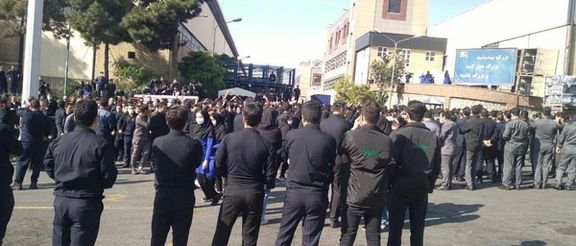
The workers of the Crouse Company, Iran’s largest automobile parts designer and manufacturer, went on strike on Saturday. The company is the backbone of the main carmakers of Iran, which are among the biggest sources of income for the regime.